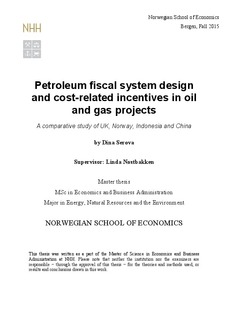| dc.description.abstract | In recent years, the oil and gas industry has been facing unprecedented cost and time
overruns while delivering megaprojects both in Norway and internationally. Combined with
a dramatic oil price drop, cost overruns became a hot topic in both academic and business
worlds. Whilst the project management aspects were in the spotlight, external factors, such
as government policies, were paid much less attention.
Although, oil companies are cost minimizers, in a situation of a moral hazard
presented in the oil and gas industry, certain petroleum fiscal designs can create incentives
for cost inflation. Thus, the focus of the current master thesis is to understand how different
fiscal designs affect cost consciousness of the companies on the examples of Norway, UK,
Indonesia and China.
According to the comparative study, petroleum fiscal design that incorporates high
marginal rates on the profits rather than revenues, i.e. more back-end loaded, in combination
with additional capital allowances and uplifts, tends to create higher incentives for operators
to inflate their costs. However, such a design is also referred to as neutral and provides
additional incentives for investments. Therefore, the optimal balance in risk sharing between
the company and the host government in petroleum fiscal designs is crucial. | nb_NO |
